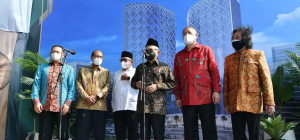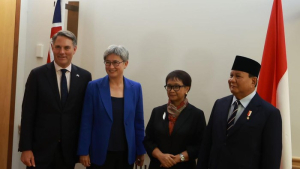Economists praise Indonesia’s trade talks with U.S.
Indonesia’s recent negotiations with the United States are seen as a strategic move aimed at safeguarding national economic interests rather than signaling a geopolitical shift away from China, said Fithra Faisal Hastiadi, Chief Economist at Samuel Sekuritas Indonesia.
Fithra said the talks, which come in light of Washington’s tariff policy aimed at reducing its trade deficit, represent a sound and calculated approach by the Indonesian government.
“I’ve spoken with the negotiation team, and this isn’t about aligning closer with the U.S. or distancing ourselves from China,” he said in a statement as quoted on Tuesday, April 22, 2025.
“It’s practically impossible for Indonesia to choose between the two, as both are our largest trading partners,” he added.
Fithra stressed that China remains a vital economic partner, especially due to geographical proximity and Indonesia’s membership in regional trade frameworks, such as the Regional Comprehensive Economic Partnership (RCEP) and ASEAN-China Free Trade Agreements.
He noted that U.S. criticism regarding Indonesia’s non-tariff barriers had surfaced long before former President Donald Trump’s tariff policies. As such, he believes the Indonesian government had ample time to prepare a well-considered negotiation strategy.
“This situation is still manageable,” he said. “We are not being forced to take sides. As for systems like QRIS and GPN, those are negotiable issues − not something to fear.”
On domestic trade policies, Fithra pointed out that the local content requirement (TKDN) can be burdensome for industries by limiting access to key production inputs, ultimately affecting competitiveness and global supply chain participation.
“TKDN should be in place, but not set too high. Otherwise, our industries become inefficient,” he said.
He also criticized import quotas, describing them as prone to rent-seeking behavior. “The lesser evil, though not perfect, is to impose import tariffs instead.”
Despite the complexities, Fithra remains optimistic about the negotiation outcomes. He believes there is a significant potential for the U.S. to grant Indonesia a zero percent tariff rate on certain products.
“If we use a weighted average tariff scenario, it would be around 4 percent to 5 percent between Indonesia and the U.S. So, there is still room for lower tariffs,” he concluded.
Sovereignty and U.S.-China tariff war
As the trade war between the United States and China escalates, Indonesia is being called upon to navigate the tensions with a strategic and sovereign approach, rather than becoming a passive player in the economic rivalry between two global superpowers.
China’s Ministry of Commerce has issued a stern warning to countries negotiating tariff relief with the U.S., urging them not to do so at the expense of their trade ties with Beijing. China has also threatened retaliation against any nation perceived to be yielding to Washington’s pressure.
At the same time, Indonesia has dispatched an economic delegation to the U.S. to initiate discussions on tariffs. This move, however, must be carefully calibrated and not perceived as a reactionary response to global pressure.
The economic shockwaves triggered by former President Donald Trump’s drastic tariff hikes − up to 145 percent on Chinese products and counter-tariffs of 125 percent from Beijing − have already disrupted supply chains and threatened broader global trade stability.
Southeast Asia, particularly ASEAN, has found itself at the epicenter of this geopolitical contest. ASEAN’s trade with China reached US$234 billion in Q1 2025, while its total trade with the U.S. in 2024 stood at US$476.8 billion. This dual dependency places countries like Indonesia in a delicate position, demanding nuanced and multi-directional policies
“Indonesia must not respond with an inferiority mindset,” Syafruddin Karimi, a lecturer in the Department of Economics at Andalas University, said.
“As a sovereign state with a long tradition of independent foreign policy, we must assert our stance confidently.”
Karimi emphasized that Indonesia’s “free and active” foreign policy should be interpreted as proactive rather than passive. The country, he said, should leverage its political legitimacy in platforms such as D-8, OIC, ASEAN, and BRICS to promote a fairer global trade system.
As a leader among developing nations, Indonesia holds both a moral and strategic position to rally the Global South against unilateral economic pressures.
Karimi suggested that Indonesia should steer clear of trade negotiations driven solely by concession lists. “We cannot offer market access or trade privileges without clear, verifiable benefits in return,” he said. “Reciprocity must be the basis of any agreement.”
He also cautioned against allowing external pressures to influence domestic policymaking. Negotiations must be grounded in mutual respect and should not cross into national sovereignty.
Concrete steps, Karimi argued, include reorienting economic diplomacy based on internal strengths, boosting domestic industry, addressing export barriers, and developing cross-sectoral diplomatic strategies.
Ideally, this strategy would allow Indonesia to position itself as an equal partner to both the U.S. and China − mitigating dependency, expanding industrial capacity, and attracting greater foreign investment due to perceived stability and rational policymaking.
However, Karimi warned that without a clear direction, Indonesia risks losing credibility with both powers. This could result in continued one-sided concessions with minimal gain, weakening the country’s long-term economic leverage on the global stage.
“Indonesia doesn’t have to choose between the U.S. and China,” he concluded.
Already have an account? Sign In
-
Start reading
Freemium
-
Monthly Subscription
20% OFF$29.75
$37.19/MonthCancel anytime
This offer is open to all new subscribers!
Subscribe now -
Yearly Subscription
33% OFF$228.13
$340.5/YearCancel anytime
This offer is open to all new subscribers!
Subscribe now







